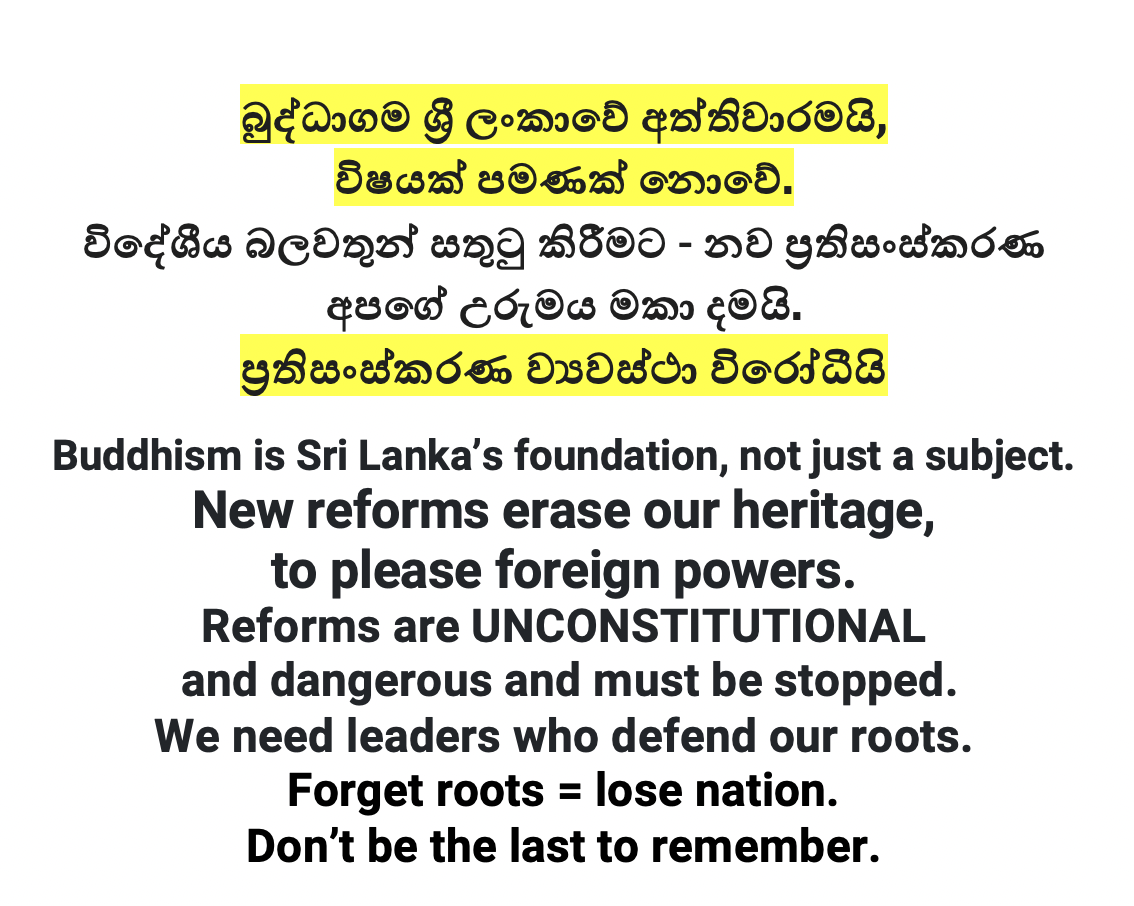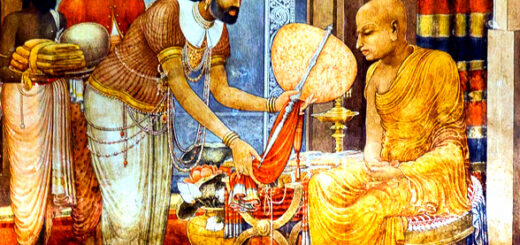How the New Education Reforms are Planned to Remove Buddhism from Sri Lanka’s Future

Sri Lanka’s new education reforms (2025–2029) may appear technical and modern on the surface, but a closer examination reveals a deliberate and systemic effort to dismantle the Buddhist civilizational foundation of this nation. This is not mere negligence — it is a calculated attempt to sever future generations from the Dhamma that has guided our society for over 2500 years. The tragedy is that those driving these reforms lack any true understanding or grounding in that heritage. It is precisely this rootlessness that has contributed to the nation’s decline. Any genuine reform must strengthen this foundation, not erase it.
Buddhism is not a Religion — It is a Civilizational Way of Life
Education Reforms Sri Lanka PPT for 2025.07.11 for Parliament new
To reduce Buddhism to a “religious subject” in a credit-based syllabus is a profound misrepresentation and a historical & Constitutional violation defying Article 9 & Article 16. Buddhism is not a private belief system; it is a complete way of life that historically guided:
- Law and governance(Buddhist jurisprudence & Buddhist governance – dasa raja dhamma (the ten royal duties central to Buddhist kingship) followed by every Sinhale king and even respected by invaders)
- Economy(based on right livelihood, ethical use, sustainability, simplicity)
- Science and education(rational inquiry, mindfulness, observation)
- Mathematics, medicine, and aesthetics
- Social relationships and conflict resolution
- Statecraft and diplomacy
Even “mindfulness” — globally repackaged by the West — originates from the Buddha, who declared:
“The mind is the forerunner of all things.”
Yet, despite mindfulness being a core teaching of the Buddha and a vital practice that cultivates awareness, compassion, and mental discipline, the new curriculum neglects to teach it as an integral part of education. Instead, it sidelines Buddhist philosophy, replacing it with secular and superficial approaches that lack depth and cultural relevance, thereby depriving students of tools to develop inner resilience and ethical grounding
Yet, Buddhism is the invisible nervous system of Sri Lankan identity — remove it, and the body collapses.
This invisible nervous system connects our values, culture, and society—without it, the cohesion of Sri Lankan identity is lost.
The New Curriculum: A Blueprint for Cultural Disconnection
From Grade 1–5:
- History is removed as a standalone subject. There is no structured education in ancient civilization, kingship, achievements of the Sinhale kings, bravery of our war heroes & their battles of ancient times to the most recent over terrorism, Buddhist revival movements, or cultural milestones.
- “Religion and Value Education” is nothing but a blended, watered-down category. Buddhism is no longer central; it competes with other teachings without context or depth.
- This early stage of education is crucial because children begin to develop a sense of who they are—their cultural roots, values, and identity. However, the curriculum currently leaves this vital period devoid of any meaningful content related to history or heritage, effectively leaving children without a firm foundation to understand and connect with their own identity.
From Grade 6–9:
- History and Religion receive just 2 credits out of 35, buried among “essential subjects.”
- Transversal modules like “Global Studies” and “Digital Citizenship”are given more emphasis — values foreign to Sri Lankan traditions are quietly normalized.
- Buddhism is not taught as a cohesive worldview or way of life — it is fractured and optional. Buddhism was the way of life & must continue to be the way of life. No one has been harmed by following the principles of Buddha. It cannot be confined only to ceremonial or ritualistic role as is being done.
From Grade 10–13:
- Students can now bypass both Buddhist education and national historyentirely, especially in STEM and Skills streams.
- Buddhism is relegated to an elective subjectunder Humanities — treated on par with entrepreneurship or music, not as the civilizational core of the nation.
- There is no requirement to study Buddhist Civilization, Dhamma ethics, or even the historical role of Buddhism in state-building.
The Agenda behind the Reform
This curriculum was not written in a vacuum. Its guiding principles are globalized, secularized, and commercialized:
- It promotes vague terms like “21st century skills,” “entrepreneurial mindset,” and “industrial exposure” — all coded language for Western neoliberal assimilation. Are we restructuring our education system to mimic models that are already crumbling in the West?
- It marginalizes introspection, morality, gratitude, and restraint— core Buddhist values that have not only sustained our society for centuries but built an enduring civilization. Had we followed the kind of values promoted in these so-called “reforms,” we would have never built a unique civilizational identity — we would have simply become a forgotten extension of another state.
- These reforms aligns not with the cultural soul of this nation, but with the demands of international donors and foreign agendas, which are part of a broader scheme to socially and morally dismantle Sri Lanka’s future.
Who gave them the Right?
Can a government elected for just five years dismantle a civilizational framework built over 25 centuries?
Can bureaucrats, under foreign-funded agendas, decide that our children no longer need to know the Buddha, the Dhamma, the Sangha, or the story of our national sacrifices?
This is Not Reform. This Is Cultural Erasure.
This curriculum breaks the sacred link between child and civilization.
It rewires the mind of the Sri Lankan student to see the Buddha not as a timeless teacher of truth, but as just one option among many.
It replaces spiritual intelligence with corporate conformity — turning students into programmable units, not human beings with minds, hearts, and souls.
Our Demand
Restore Buddhism as a mandatory, standalone subject — from Grade 1 for Buddhist children.
Embed Buddhist moral, social, and philosophical teachings across all stages of education.
Teach history honestly — not fractured facts, but a living heritage.
A nation that forgets its roots is easily uprooted. Let us not be the last generation that remembers. These educational reforms cannot be allowed to pass, as they clearly violate our Constitution and threaten to erase our sacred civilizational heritage—all in the name of ‘modern education’ and under pressure from foreign funding, loans, and aid conditions.
We expect elected leaders who stand firm for our nation’s values—not be spineless appeasers or officials who act without conscience
Shenali D Waduge







